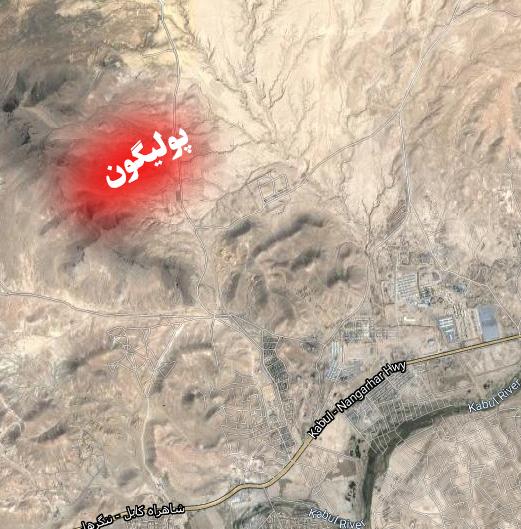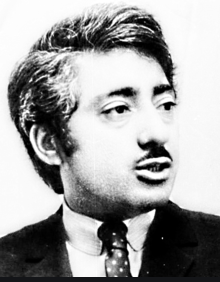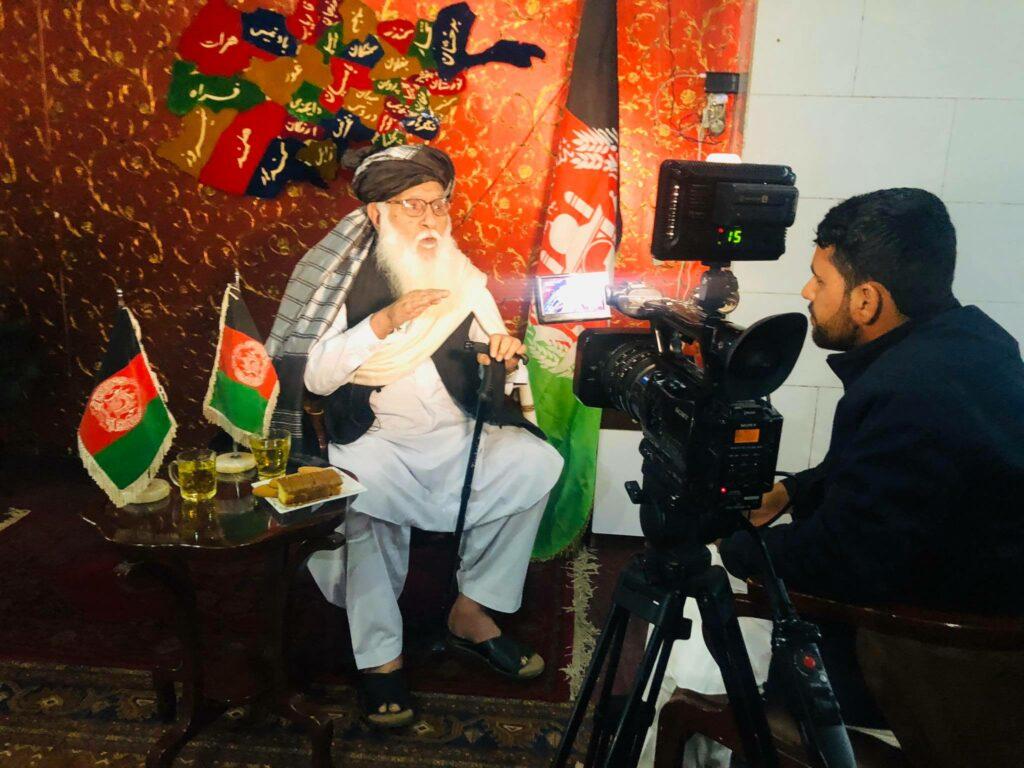KABUL (Pajhwok): A retired army general, telling heartbreaking tales of four decades of war, including the assassination of Afghanistan’s first president Mohammad Daud Khan, wants the warring parties to unite and put an end to the killing of the compatriots.
The 85-year-old Badshah Mir Tanai, hailing from the Tanai district of southeastern Khost province, is currently living in Kabul.
Tanai, who has graduated from the Military University, in Kabul, served in different positions at the Ministry of Defence. In early years of ex-president Hamid Karzai’s rule, he retired as major-general.
In a room of his residence, Gen. Tanai has hanged the photographs of his youth, a strong man, wearing a neat military uniform. But now, he has lost his youth, sporting a long grey beard.
The retired general has so many bitter memories of Afghanistan. He entered the room with a stick in his trembling hand for an interview with Pajhwok Afghan News.
He said: “I’m disturbed by the war and the worsening situation in the country. I wish we have peace in our homeland and swap sweet memories of peace instead of misery and war.”
Tanai recalled, during King Zahir Shah’s rule, he served as maintenance commander of the 4th battalion in Polygon near the Pul-i-Charkhi area of Kabul.
After the rule of Mohammad Daud Khan, the People’s Democratic Party government killed a number of people in front of his eyes in Polygon area.
Gen. Tanai remained silent for a moment, as if he is still looking at the scene of the massacre by the rulers of the time and the tragedy does not let him speak.
After a pause, he broke his silence and began speaking about atrocities of that time. The former soldier commented he would not forget the massacre until the Day of Judgment.
He said after the April 28, 1978 coup of People’s Democratic Party of Afghanistan, Mohammad Daud Khan was assassinated along with about 16 members of family and buried in Polygon of Pul-i-Charkhi area in front his eyes.
“It was 1:00am, when tarpaulin-covered cars with circular lights came and were parked in front of us. The people who came in the vehicles asked for taking out the bodies. Two soldiers got into the vehicles and took out the first corpse.
“I didn’t recognise this body, which was thrown it into the ditch. Then a second body was thrown into it. I recognised this body. It was of Daud Khan. The corpses of Daud Khan’s 16 family members were also thrown into the ditch,” he explained.
Some high-ranking officials of the “communist regime” were also present at the scene, monitoring the process, Tanai continued.
He added: “When all martyrs were dropped off the vehicles, I ordered my soldiers to remove the green tarpaulin from the cars and place it on the dead…. Then they (the communists) buried them and drove over a jeep on the dead.”
Tanai said he later marked the mass grave, some 95 steps from the road. In 2008, he showed Daud Khan’s family members and government officials the area with the help of two locals.
According to some sources Hamidullah and Maullah Gul are the two local elders and they helped the elderly retired general to exactly locate the area of mass graves.
After 30 years, on June 28, 2008, the bodies of Daud Khan and his family members were found in two separate mass graves outside the walls of Pul-i-Charkhi prison, and laid to rest at a special ceremony near the Dar-ul-Aman area of Kabul.

He said Musa Shafiq (prime minister in the Zahir Shah government) and several of his friends also killed in Polygon area by the People’s Democratic Party.
Tanai recollected: “One night, a car came to Polygon, some people disembarked from it. I could not recognise them all. But one of them was former prime minister Musa Shafiq and another was Wafiullah Sami, the justice minister. Paktia governor Mohammad Gul was also among them.”
Wafiullah Sami, the justice minister. Paktia governor Mohammad Gul was also among them.”
Musa Shafiq told the people who had brought the three to the area: "I am not a sinner, I have no male children. I have two daughters. What is my sin?" They replied, "You are guilty of selling Helmand water.”
Musa Shafiq told them that despite being the prime minister, he was living in an ordinary home. As far as the Helmand water issue was concerned, the council of minister had decided on it.
Tanai quoted Shafiq as saying: “I had just signed the document.” Subsequently, ex-general said, the individuals opened fire at them from behind, killing Shafiq, Sami and Mohammad Gul. Their bodies were thrown into a ditch.
Some sources say Shafiq was imprisoned for two and a half years by the Daud government. Later on, he was released. But he was imprisoned for a second time after the coup of 1978. He was killed the same year.
Musa Shafiq, as prime minister, signed the Helmand Water Agreement with Iran in 1972. Under the pact, 20 percent of Helmand River's water, flowing at 26 cubic meters per second, was given to Iran.
Shafiq was killed on charges of "selling Helmand water" at a time when people now want the agreement on the Helmand River to be implemented, and Afghan President Mohammad Ashraf Ghani has called the deal one of Shafiq's most important deeds.
Tanai said not only Daud and his family members, Shafiq and two others were buried in Polygon area during Khalq and Parcham Parties’ governments, dozens of other people were handed similar treatment alive.
The People's Democratic Party staged a coup on April 28, 1978, overthrowing Daud Khan's regime, and the Soviet military invaded Afghanistan with the support of the People's Party and the Khalq and Parcham groups. The Afghans resisted the invasion, laying down their lives and forcing the Soviet troops to withdraw.
Then a civil war erupted and the Taliban movement came to power. In 2001, US and NATO forces invaded Afghanistan, ousting the Taliban regime, but the war is still going on and Afghans continue to be killed every day.
"In all wars, I remember, Afghans have been killed on one pretext or another, at the behest of one country or another," the retired general regretted.
"One day, the communists told each other Tanai should also be eliminated because he has been witness to harrowing incidents. He may create problems for us one day. The person who was making tea for them (communists) let me know….. So I came home, took off my uniform and went to Khost. There was misfortune in Khost too even no one could turn one a lamp in his room, if someone does, tomorrow they would asked who you were at night and what you were doing. I could not stay there and went to Pakistan and came back in the early day time of Hamid Karzai’s government,” Tanai explained.
The retired general is yearning for peace and said during his days of service people were desperate for peace, the war was imposed from outside and nobody cared about Afghans.
Tanai maintained: "Most wars are not rational. Those who provoke wars those who do not show mercy to humans, those who kill people for the sake of position and ranks are to be blame and Allah will punish them."
He went on to add; "There is an urgent need for peace in Afghanistan, the ongoing war must end because the Afghans are being killed on both sides.
“The Afghans are as thirsty for peace as a person fasting and counting minutes to the evening to break the fast," Tanai added.
Addressing the warring parties, he said: "People say no matter how long you fight, you will get nothing except the killing of Afghans. You will make peace, as it is important to do so as soon as possible to stop the bloodshed of innocent Afghans.”
"Peace is good, peace is pride, peace is life, development and prosperity. Fortunate are leaders and people who wipe away tears of their suffering Afghans and strive to win the title of peace," he remarked.
He hoped the Istanbul summit would have a positive outcome and help end the long war in Afghanistan.
Efforts for peace has been accelerated in the recent part after US proposed a high level meeting of Afghan government, the Taliban, Afghan politicians and representatives from regional and major powers under the auspices of UN in Turkey. Taliban, however, lately announced they were not ready for the meeting during the month of Ramazan.







GET IN TOUCH
NEWSLETTER
SUGGEST A STORY
PAJHWOK MOBILE APP